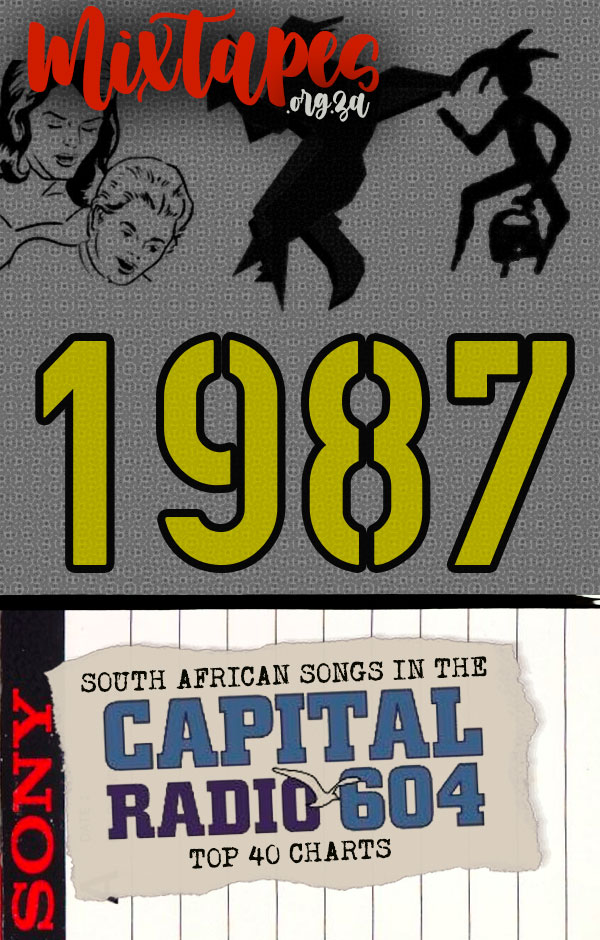
There was a healthy variety of South African music in the Capital Radio charts in 1987 from the wistful South African pop rock of Bright Blue, the Afro pop of Sipho Mabuse and Brenda Fassie to the political energy of Savuka and Hi-NRG Euro disco of People Like us, and the novelty studio sounds of Pocket Lips with several other artists making up the 14 South Africans which made the Top 40 countdown.
If there is one particular theme which characterises several of the performers who charted on Capital Radio in 1987 it is a sense of artistic reincarnation combined with renewed creativity. After over a decade performing with Sipho Mchunu as Johnny and Sipho and then more prominently as Juluka and then a short hiatus as a solo singer, Jonny Clegged re-emerged with his new band Savuka and with a far more overt political orientation to deal with increasingly troubled times in South Africa. This is clearly borne out in the song that charted on Capital – “Missing” – which dealt with the disappearance of political activists opposing the apartheid regime. Neill Solomon had a very short period of success on the Capital charts in the early ’80s with the Uptown Rhythm Dogs but in 1987 returned with the Passengers. Cindy Dickinson, who had first made her mark in South Africa as a solo artist and then with Syndicate in 1987, appeared on the Capital charts with People Like Us, who, like Savuka, were as or more popular in parts of Europe than they were in South Africa. Several members of the early ’80s kwela-ska infused band Pett Frogg re-emerged when they morphed into Mango Groove who developed a sound which captured a growing mood towards a more harmonious South Africa.
Also in 1987, Wendy Oldfield left Sweatband to embark on a solo career in which she could move away from a rock sound dominated by the band to explore her own pop-soul sound as a singer-songwriter in her own right, to create what she referred to as “a new kind of Wendy thing”. Also reinventing herself as a solo artist with her first solo album in 1987 was Brenda Fassie who left behind the Big Dudes and began a hugely successful solo career. Meanwhile, Bright Blue, who charted on Capital in 1984 with “Window on the World”, had taken a forced break of two years while Dan Hartman and Ian Cohen served two very reluctant years of conscription in the South African Defence Force. Bright Blue re-emerged in 1987 without former lead singer Robin Levetan but nevertheless with what was to become one of the anthems of the transition to a post-apartheid South Africa, “Weeping”.
Established artists such as Lesley Rae Dowling, Jonathan Butler and Sipho Mabuse continued to chart on Capital, as did Sweatband (still with Wendy Oldfield as vocalist) and new arrivals on the scene Pocket Lips and 909, both of whom developed more in the studio rather than on the stage.
The most successful of the South African songs on the Capital charts in 1987 were Mango Groove’s “Move Up” and Wendy Oldfield’s “The Real World” which both reached number 1. Surprisingly, “Weeping” by Bright Blue spent two weeks at number 2 but missed out on the top spot. Jonathan Butler also peaked at number 2 with “Lies” but lower down, at number 5, with “Holding On”. “It’s Amazing” by Pocket Lips reached number 3.
Savuka’s “Missing” got as far as number 8 while “Tonight” by Sweatband peaked at number 10, as did Lesley Rae Dowling with “When the Night Comes” and “Hold On” by the Passengers (where it spent two weeks). 909’s “What Are We Going to do About Love” and Sipho Mabuse’s “Shikisha” both peaked at number 20 while Brenda Fassie’s “Mr. No Good” only reached number 21 and “Hiroshima” by People Like Us peaked at number 22.
Show Playlist + Poll–

